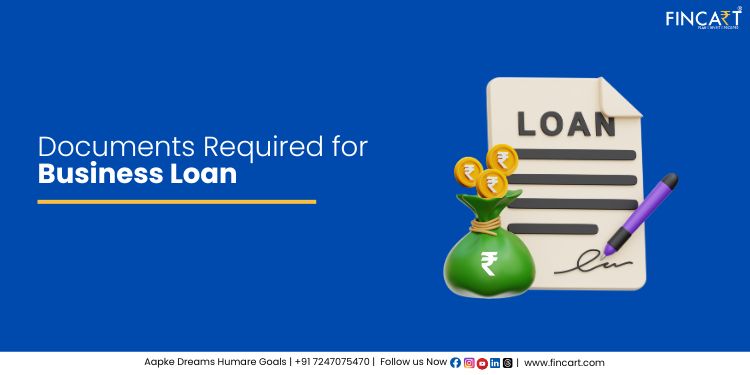Securing a business loan in India necessitates the submission of specific documents that help lenders assess your creditworthiness, business stability, and financial health. Being well-prepared with the required documentation can expedite the loan approval process and improve your chances of obtaining financing. Below is a comprehensive guide to the key documents typically required when applying for a business loan in India.
1. Identity Proof
Lenders require valid identification to verify the authenticity of the applicant. Acceptable documents include:
· PAN Card
· Aadhaar Card
· Passport
· Voter ID Card
· Driving License
These documents help establish the legitimacy of the applicant. Ensure that all identity proofs are consistent across documents to avoid discrepancies. Keep a scanned copy of these documents ready for online applications.
2. Address Proof
Proof of residence is essential to confirm the applicant’s address. Acceptable documents include:
· Passport
· Aadhaar Card
· Voter ID Card
· Driving License
· Utility Bills (e.g., electricity, water, telephone)
· Lease or Rent Agreement
3. Business Continuity Proof
Demonstrating the ongoing operation of your business is crucial. Relevant documents include:
· Shop and Establishment Certificate
· GST Registration Certificate
· Trade License
· Sales Tax Certificate
· Income Tax Returns (ITR) of the business
· Customer or vendor testimonials to demonstrate long-term relationships.
· Proof of recurring transactions such as purchase orders or signed contracts.
4. Financial Documents
Lenders assess financial stability through various documents:
· Income Tax Returns (ITR): Typically, the last 2-3 years’ returns are required.
· Balance Sheet and Profit & Loss Statements: Audited financial statements for the previous 2-3 years. Small businesses should work with a certified chartered accountant to prepare audited reports. Lenders favour businesses that showcase transparency and adherence to financial best practices.
· Bank Statements: Bank statements for the last 6-12 months.
· GST Returns: GST compliance often reflects operational integrity. Non-compliance may lead to rejections or higher interest rates.
· Cash Flow Statements: If you operate a cash-heavy business, providing a detailed cash flow statement adds credibility.
5. Business Ownership Proof
Depending on the business structure, the following documents are necessary:
· Sole Proprietorship: Sole Proprietor Declaration, GST Registration Certificate.
· Partnership Firm: Partnership Deed, Registration Certificate.
· Private Limited Company: Certificate of Incorporation, Memorandum and Articles of Association, Board Resolution.
6. Collateral Documents (if applicable)
For secured loans, details of assets pledged as collateral are required:
· Property Documents: Title deed, sale agreement.
· Valuation Reports: Recent valuation reports of the collateral.
Collateral Tips:
Valuation Reports: Obtain a report from a certified valuer before applying.
Encumbrance Certificates: Ensure the asset is free of any legal liabilities.
Photographs of Property/Assets: Some banks might require visual evidence of the collateral.
7. Other Documents
Additional documents that may be required include:
· Project Report or Business Plan: Detailing the purpose of the loan and projected financials.
· Proof of Qualification: For professionals (e.g., doctors, architects), relevant qualification certificates.
For startups or businesses seeking growth, a detailed project report may be the most critical document.
What to Include in Your Report:
· Business overview and objectives.
· Market analysis, including competitors and demand forecasting.
· Revenue models and expense projections.
· Break-even analysis.
· Loan repayment plans.
Document Checklist by Business Entity Type
A condensed list of documents according to the kind of corporate entity is provided below:
| Document Type | Sole Proprietorship | Partnership Firm | Private Limited Company |
| Identity Proof | Yes | Yes | Yes |
| Address Proof | Yes | Yes | Yes |
| Business Continuity Proof | Yes | Yes | Yes |
| Financial Documents | Yes | Yes | Yes |
| Business Ownership Proof | Proprietor PAN Card | Partnership Deed | Certificate of Incorporation, MOA, AOA |
| Board Resolution | N/A | Yes | Yes |
| Collateral Documents (if secured) | Yes | Yes | Yes |
Tips for a Smooth Application Process
Organize Documents: Ensure all documents are up-to-date and organized.
Verify Requirements: Different lenders may have specific documentation requirements; always check with your lender.
Maintain Transparency: Provide accurate information to avoid delays or rejection.
Seek Professional Help: Consult with financial advisors or accountants if needed to prepare the necessary documents.
Being thoroughly prepared with the appropriate documentation not only facilitates a smoother loan application process but also enhances the likelihood of securing the necessary financing for your business endeavours.
Digital Transformation: Applying for Loans Online
In India, many financial institutions now offer digital loan applications. Here’s what you should know:
Digital KYC: Platforms like Aadhaar-enabled e-KYC simplify the process.
Document Uploads: Prepare scanned copies of all documents in commonly accepted formats (PDF, JPEG).
Automated Verification: Many lenders use automated systems to verify GST, PAN, and ITR records instantly.
Turnaround Time: Digital applications often have faster processing, sometimes within 24 hours.
Conclusion
Getting a business loan in India is simpler when you have all the required documents ready, like identity proof, financial records, and business registration papers. Accurate records, a clear understanding of what the lender needs, and a solid plan for how you’ll use and repay the loan are key to getting approved. Different lenders might ask for slightly different things, so it’s always a good idea to check their requirements. By staying organized and prepared, you can apply for a loan with confidence and take a big step toward growing your business.
FAQs for Business Loan Applicants
1: Can I apply for a loan without collateral?
Yes, many financial institutions offer unsecured business loans based on creditworthiness and business performance.
2: Are there specific loans for women entrepreneurs?
Yes, schemes like the Mudra Loan (Shishu, Kishore, Tarun categories) and Stand-Up India provide financial assistance to women-led enterprises.
3: What is the typical processing time for a business loan?
It can vary from 2-15 days, depending on the lender and the type of loan (secured/unsecured).
4: What is the minimum CIBIL score required to get a business loan?
Most lenders in India prefer a CIBIL score of 700 or above for business loans. However, some NBFCs and fintech lenders may approve loans for applicants with lower scores, albeit at higher interest rates.
5: Are business loans tax-deductible?
Yes, the interest paid on a business loan can be claimed as a deduction under Section 37(1) of the Income Tax Act, 1961, provided the loan is used solely for business purposes.




